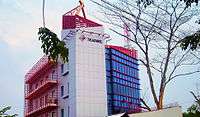Telkomsel
PT Telekomunikasi Selular, trading as Telkomsel, is an Indonesian wireless network provider founded in 1995 and is a subsidiary of Telkom Indonesia. It is headquartered in South Jakarta.
 | |
| Subsidiary (P.T. in legal form) | |
| Industry | Telecommunication |
| Founded | Jakarta, Indonesia (26 May 1995) |
| Headquarters | Telkomsel Smart Office, Jl. Jendral Gatot Subroto kav. 52, Jakarta, Indonesia |
Key people | Setyanto Hantoro (CEO) |
| Products | kartuHalo, simPATI, Kartu As, Flash, by.U, and LOOP |
| Owners | PT Telekomunikasi Indonesia Tbk (65.0%)[1] Singapore Telecommunications Limited via its wholly owned subsidiary Singapore Telecom Mobile Pte. Ltd. (35.0%)[2][3] |
| Parent | PT Telkom Indonesia Tbk |
| Website | Official website |

Telkomsel is the largest wireless carrier in the country with 163 million customer base as of 2018.[4] The company Operates their GSM network on the 900–1800 MHz frequency range, as well as 3G and 4G services on other frequencies. Telkomsel operates a variety of sim card brands, chief among them are simPATI and kartuHALO. These brands differ on their payment model (pre-paid vs. post-paid) as well as pricing. As of 31 March 2015, Telkomsel has 46% of the Indonesian wireless service market share.[5]
History
Telkomsel was incorporated on 26 May 1995 in Jakarta, Indonesia. It is majority owned by Telkom Indonesia with 65% of the shares, with Singapore Telecommunications Limited owning the minority 35%.[6] In November 1997, Telkomsel became the first wireless carrier in Asia to introduce rechargeable GSM pre-paid services. In September 2006, Telkomsel became the first carrier in the country to launch a 3G service.
On 20 March 2009, Telkomsel and Apple South Asia Pte. Ltd. launched the iPhone 3G in Indonesia with customised price plans for all of Telkomsel's customers.[7] Three years later, Telkomsel had acquired more than 100 million active customers.[8]
In April 2017, the company website was hacked, and a message protesting about high charges and unnecessary extra services was posted. There was widespread support for the hacker on social media.[9]
Network coverage
As of 2018, Telkomsel has 160.705 Base Transceiver Stations (BTS) with 68.7% being 3G/4G capable.[10] The network uses GSM Dual Band (900 & 1800), GPRS, EDGE, 3G, and 4G technologies.
The company has 323 international roaming partners in 170 countries (September 2008). In addition, Telkomsel has worked with network carriers in neighboring countries to offer the co-branded simPATI Kangen product for Indonesians living abroad.
References
- "Continuing to Win in the Digital Era" (PDF). Telkomsel.com. Retrieved 26 April 2017.
- "Shareholding Pattern | Bharti Airtel". Airtel.in. Archived from the original on 24 May 2012. Retrieved 28 June 2012.
- "Shareholding Pattern as of Dec 2011| Bharti Airtel" (PDF). Airtel.in. Archived from the original (PDF) on 26 August 2012. Retrieved 28 June 2012.
- "Telkomsel 2018 Annual Report" (PDF).
- "Annual Report 2014" (PDF). Info.singtel.com. Retrieved 26 April 2017.
- "Telkomsel on BusinessWeek". Investing.businessweek.com. Retrieved 23 July 2010.
- "Archived copy". Archived from the original on 17 December 2011. Retrieved 7 December 2011.CS1 maint: archived copy as title (link)
- "Telekomunikasi Indonesia – Telkom – Indonesia Investments". Indonesia-investments.com. Retrieved 26 April 2017.
- Dion Bisara; Herman (18 April 2017). "Telkomsel Hacked, Customers Vent Frustration Over Internet Price". The Jakarta Globe. Retrieved 15 May 2017.
- Center, PT. Indonesia News. "Pelanggan Telkomsel Membludak, Jumlah BTS Digenjot". inilahcom. Retrieved 25 July 2018.